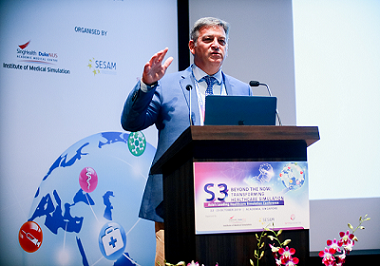Creating a Sustainable Quality Improvement (QI) Program - Lessons Learned Through Filming and Debriefing Real Neonatal Resuscitations
Main Conference ProgrammeDate: 06 Nov 2025, Thu | Time: 1300 - 1430 | Track Type: Workshops
Format: Face-to-face | Venue: Level 2, L2-S1, Academia
Speaker: Mr Rodrigo B. Galindo
Driving change in patient care units requires effective quality improvement programs that methodically identify weaknesses. This presentation will provide an overview of how the team at CAPE at Stanford Medicine conceptualized and implemented Resus One, a human and system performance QI program that is based on securely recorded video of real neonatal resuscitations. The methodology used for the creation of Resus One will be broken down into an assessment, planning, implementation, evaluation (APIE) process format. The presentation will also walk through how video is used in confidential monthly debriefings and how information learned in those debriefings is used to implement change within the NICU. Additionally, recently published work on will be shared on how Resus One has also supported neonatal team process improvement involving 1) role clarity/task allocation and 2) communication challenges when summoning neonatal delivery teams. The workflow processes have the potential ability to be applied in other types of healthcare systems and/or patient populations.
For the workshop activity participants will break out into small groups and come up with a QI initiative and develop a blueprint for getting buy in from stakeholders and resources for sustainability and further development. Small groups will then present their QI initiative and blueprint with the larger group for discussion.
Learning Objectives:
- Participants will be able to briefly describe fundamentals of QI
- Participants will learn how to use the APIE workflow process
- Participants will understand how to promote buy-in and continued support of QI projects
© 2025 SingHealth Group. All Rights Reserved.














